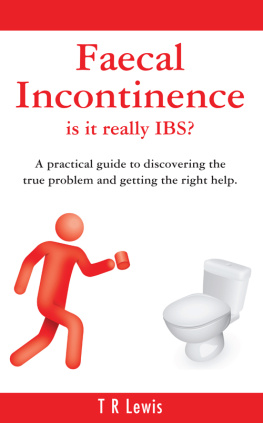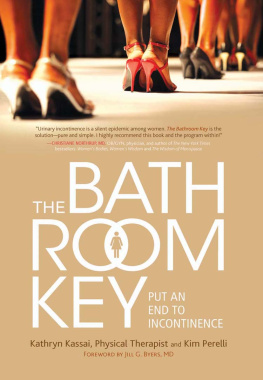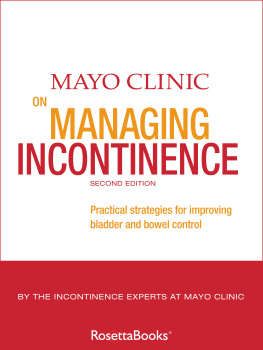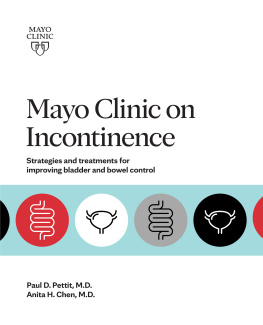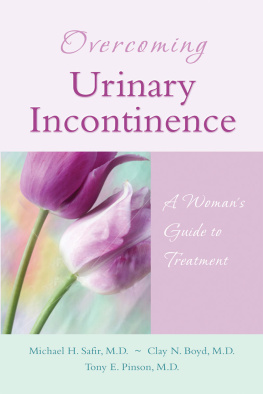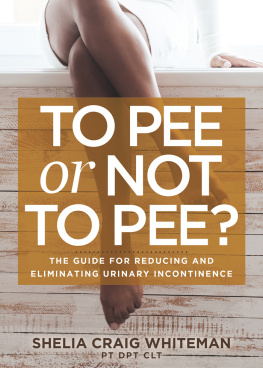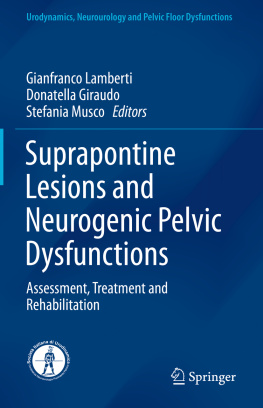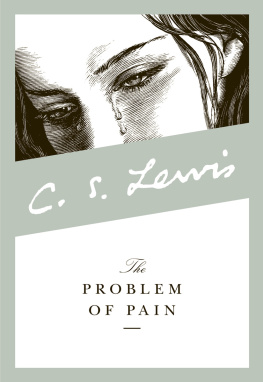
Index
In fond memory of
Evelyn Segal
1929 - 2015
Preface

Id never thought of writing a book and had I, I would certainly have liked to start it with something along the lines of ...once upon a time. This story however is no fairytale, in fact its more like a horror story.
In short I was diagnosed with IBS when I was in my mid twenties. I had had some episodes of uncontrollable faecal incontinence already. I blindly accepted a diagnosis of IBS (Irritable Bowel Syndrome), initially no tests were done, not even a digital examination of my rear passage. The next twenty five or so years of my life were, at times, hell because of my inability to control my bowels. Then a chance meeting, with the son of a dear friend, Professor Tony Segal, changed my life.
It wasnt IBS, it had never been IBS and as a result Id realistically gone twenty five years without any treatment, or at best with limited or incorrect treatment attempts.
In those twenty five years Ive gained a large amount of knowledge on what should be done to ensure an accurate diagnosis is reached. If youre reading this book then chances are you are a sufferer. I hope this book will help prevent you from falling into the same misdiagnosis black hole that engrossed me.
Introduction

What prompted me to write this book is the fear that what happened to me may be happening to others right now. Im not saying that everyone who reads this book will find the cure for their problem, but Im hoping that along the way some will gain from my experience and push to get the investigations done that will determine the exact cause of their symptoms. You should have hope that there is something that can be done for you as there are options available, but only if you know what is wrong with you in the first place.
Its important to remember that regardless of how minor, or how severe your particular problem is, or how long youve suffered with it, few GPs, your first port of call, are equipped with the specialist knowledge to investigate faecal incontinence thoroughly. Im not having a dig at GPs, far from it I think they are great, but you just cant expect them to have the depth of knowledge a specialist has spent many additional years gaining.
Sadly my experience shows me that many gastroenterologists (who one would think should have the knowledge) are not 100% up to speed on this topic either. Are you even aware that there are doctors, and nurses, who specialise in incontinence? I was most certainly not aware of it until recently. Over the years I saw five GPs, three gastroenterologists, two psychologists, two acupuncturists and a psychiatrist (it sounds like a song!) before finally, by chance, meeting the man who saw past the hand-me-down diagnosis of Irritable Bowel Syndrome (IBS). It took him about five minutes to diagnose my main problem which was nothing at all to do with IBS. He referred me to St Marks Hospital in Harrow (London, England), which is a centre of excellence for all things bowel. I finally received the thorough investigations that needed to be undertaken to discover that my problem was actually part physical, part dietary and part endorcrinal.
Faecal incontinence is debilitating, it affects every part of your life. It causes social isolation, lowers self esteem, may cause depression and, for me, left me exhausted and drained for much of my younger life. Bowel habits are scarcely dinner table conversation so you will rarely, if ever, hear people talking about it. You may well think that you are the only one with this problem or that there cant be many others with the problem. Well, youre wrong! The NHS (National Health Service) published guidelines in 2007 that state that between 1% and 10% of the UK population suffer with faecal incontinence and the National Institute of Health in the US estimated that in America there is somewhere in the region of eighteen million people known to have faecal incontinence. I say known because faecal incontinence is one of the most under reported and therefore undiagnosed conditions. That makes sense, we see it as shameful, disgusting and the thought of an adult pooing their pants, like a baby, is horrific. The last thing most people will do is talk about it.
Faecal incontinence affects both sexes of all ages although more women are affected than men. In the elderly faecal incontinence is a major reason for institutionalisation as both the sufferer, and their families, find the condition extremely hard to live with. The loss of dignity, regardless of age or gender is impactful. Faecal incontinence may be a minor nuisance to you or, if it is severe, it may be a tragedy for you; your lifestyle may alter dramatically. Fear of embarrassment makes some sufferers avoid sexual relations so the potential impact of this condition on relationships and families is wide reaching.
Given the degree of embarrassment associated with faecal incontinence many people avoid telling their doctors about it and few, if any, GPs think to question patients about their continence. As a result the circle of silence is maintained, the condition goes undiagnosed, untreated, and people suffer needlessly.
Please dont think this book is intended to replace your doctor, its not, but I do hope it will give you a sound basis for starting a constructive dialogue with them and possibly even prompt them to investigate you a little more thoroughly.
Had I known what I know now my life would have
been completely different
BUT remember everything that happens to you makes
you who you are.
If you like yourself then perhaps this was all a life
enhancing experience.
My story

I was born in 1965 in London. In 1966 my parents decided to emigrate to Australia. Mother all too frequently delights in entertaining others with the story of my nappy rash on the flight; looking back I now wonder if that was an omen of things to come!
I recall (I was just twenty or so), finding it hard to urinate without opening my bowels or at least being seated on the toilet to allow me to be able to open them if needed. I always had to use a cubical as standing at the urinal to go made me instantly want to open my bowels. The relaxing of my urethral sphincter, to allow the urine to pass, seemed to trigger a need to defecate. I got a little ribbing about it from friends but just shrugged it off as Id had a lot worse than that over the years. Being a classical music loving male child growing up in the suburbs of Sydney lent itself to more than a fair share of bullying. Though I think in those days, the 70s and 80s, bullying was all part of a thing called growing up. With hindsight this was a clear signal that something was wrong down-below but it didnt seem serious at the time so I thought no more of it.
I moved back to London in 89 and was having a whale of time in the exciting and vibrant city lights. I got a job in a large department store (Harrods) and was doing really well in terms of progressing up the ladder. My life was just fun! The only stress I could honestly say I was under was that of trying to get up the said ladder. Im a very positive person so I thought I was rather thriving on the pressure and expectation.
Next page
